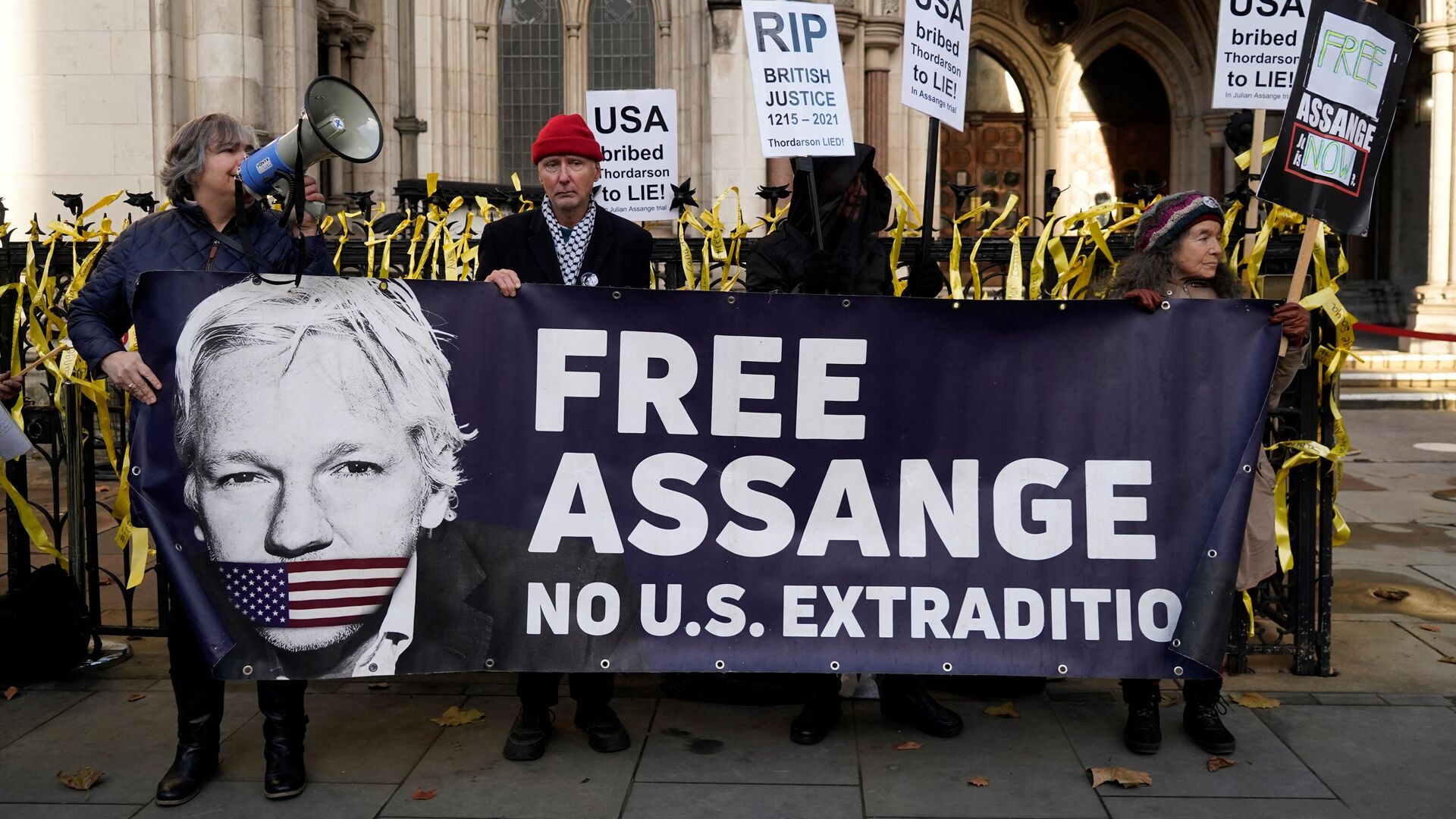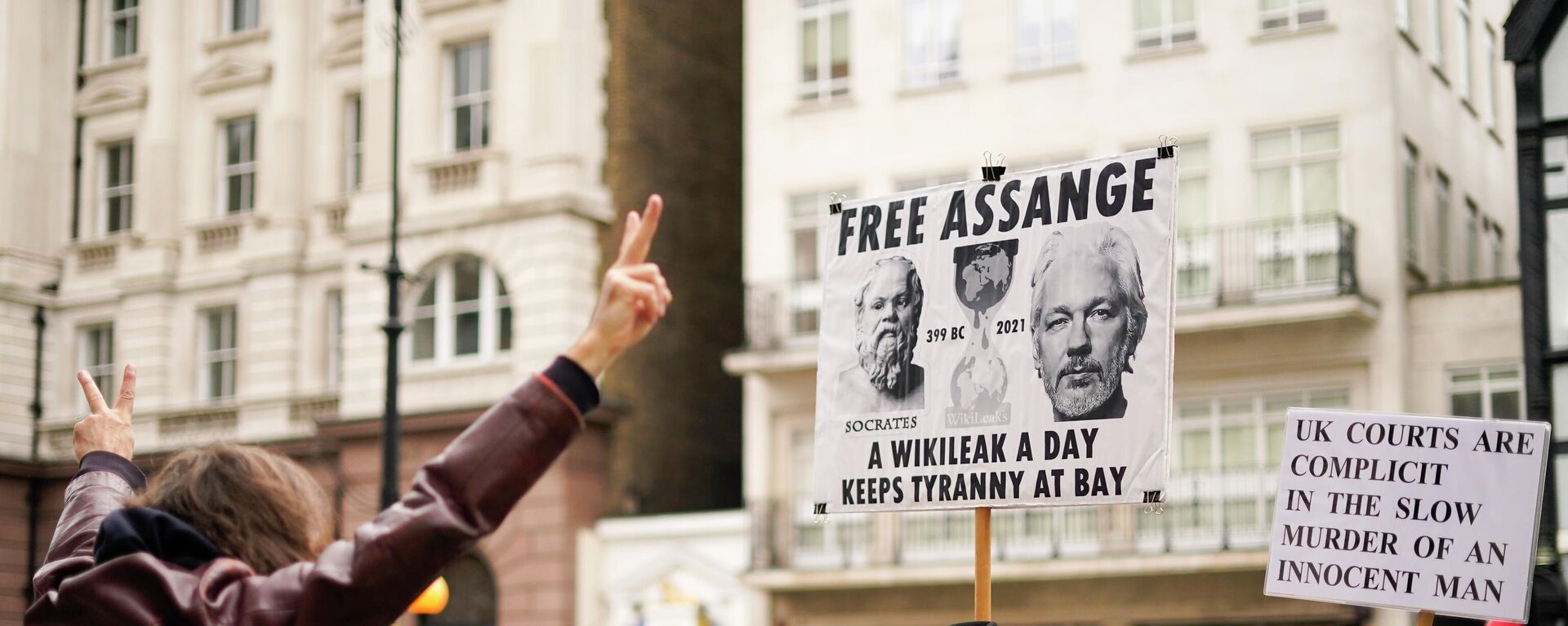https://sputnikglobe.com/20220618/assanges-extradition-to-us-is-a-signal-to-all-journalists-who-expose-americas-crimes-scholars-say-1096426404.html
Assange's Extradition to US is a Signal to All Journalists Who Expose America’s Crimes, Scholars Say
Assange's Extradition to US is a Signal to All Journalists Who Expose America’s Crimes, Scholars Say
Sputnik International
Home Secretary Priti Patel signed the extradition order for Julian Assange on 17 June, after Washington's victory in the UK court reversing a ruling by a... 18.06.2022, Sputnik International
2022-06-18T08:33+0000
2022-06-18T08:33+0000
2022-08-06T13:29+0000
julian assange
extradition
us
https://cdn1.img.sputnikglobe.com/img/07e5/0c/0a/1091415757_0:320:3073:2048_1920x0_80_0_0_1cd1f9de8a4f756ccf9702ffcbaf6460.jpg
"The decision issued by the UK Home Office approving the extradition of journalist Julian Assange is deeply devastating," laments Taylor Hudak, journalist and editor at AcTVism Munich. "The western world is sending a message to all journalists and publishers that if you publish information in the public interest that embarrasses the US Empire and exposes its crimes you may face incarceration in a maximum security prison."The British Home Office stated on Friday that "the UK courts have not found that it would be oppressive, unjust or an abuse of process to extradite Mr Assange. Nor have they found that extradition would be incompatible with his human rights, including his right to a fair trial and to freedom of expression, and that while in the US he will be treated appropriately, including in relation to his health."The tussle over whether to extradite Assange has been going on since 2019. Despite the British magistrate deciding in Assange's favour in early 2021, the US appealed the ruling and won. In March 2022, the UK Supreme Court prevented the WikiLeaks founder from appealing the lower court's ruling against him. A month later, District Judge Paul Goldspring formally approved the extradition of Assange in a brief hearing at Westminster Magistrates' Court.One of the great unanswered questions about Assange's prosecution and planned deportation is what gave the US the right to even prosecute the Australian citizen, according to James O’Neill, Australia-based barrister. However, "it is not a question that has troubled the British… [who] are no more than lapdogs to the Americans," the barrister remarks.Hudak argues that Assange is unlikely to have a fair trial if extradited to the US. She highlights that neither the press nor the public would have access to cover and observe the legal proceedings.Legal Fight for Assange is ContinuingAssange has only 14 days to appeal the British government's order. "Today is not the end of the fight. It is only the beginning of a new legal battle," Stella Assange, Assange's wife, told the press on Friday.According to Vermaut, the looming legal battle is likely to be focused on such issues as the right to free expression and apparent political motivation behind Washington's relentless efforts to extradite the WikiLeaks founder.The World Council for Public Diplomacy and Community Dialogue, whose members include Vermaut as a member of the European Federation on Journalists, is deeply divided over the United Kingdom's decision. According to Vermaut, the UK appears to be "under heavy political pressure from the US to extradite Julian Assange."Everyone should continue to fight for Assange’s freedom "and thus fight for a free press and the public's right to know," says Hudak, arguing that "journalists in particular have an obligation to stand by one of their own".Human rights organisations, whistleblowers, and journalists took to social media to call upon the UK and US not to extradite Assange and drop the case against him on Friday.The US indicted 50-year-old Assange, who is Australian, on 18 federal charges which carry a maximum sentence of 175 years in prison over alleged espionage and hacking which led to the publication of classified diplomatic cables and sensitive military reports from the Iraq and Afghanistan wars by WikiLeaks. The shocking revelations exposed the US military's misconduct and alleged war crimes in central Asia and the Middle East."The Assange case is a classic example of doublethink by the West," says James O’Neill. "His 'crime' was to tell the truth about the appalling US conduct of the war in Iraq, itself based on a lie of huge proportions. None of the soldiers caught by the video shooting civilians including journalists have ever been prosecuted by the Americans. It is yet another example of 'shoot the messenger' and let the perpetrators go free."Assange spent approximately seven years at the Ecuador Embassy in London between 2012 and 2019 to escape possible extradition over exposure of the Afghan and Iraq war logs. In late 2019 his political asylum status was revoked. Since then, Assange has been held at Belmarsh maximum-security prison in south-east London.
https://sputnikglobe.com/20220617/un-says-hopes-due-process-will-be-followed-in-assanges-case-after-london-okayed-extradition-to-us-1096417023.html
Sputnik International
feedback@sputniknews.com
+74956456601
MIA „Rosiya Segodnya“
2022
News
en_EN
Sputnik International
feedback@sputniknews.com
+74956456601
MIA „Rosiya Segodnya“
Sputnik International
feedback@sputniknews.com
+74956456601
MIA „Rosiya Segodnya“
julian assange, extradition, us
julian assange, extradition, us
Assange's Extradition to US is a Signal to All Journalists Who Expose America’s Crimes, Scholars Say
08:33 GMT 18.06.2022 (Updated: 13:29 GMT 06.08.2022) Home Secretary Priti Patel signed the extradition order for Julian Assange on 17 June, after Washington's victory in the UK court reversing a ruling by a British magistrate in 2021 that the WikiLeaks founder faced a high risk of suicide in the US.
"The decision issued by the UK Home Office approving the extradition of journalist Julian Assange is deeply devastating," laments Taylor Hudak, journalist and editor at AcTVism Munich. "The western world is sending a message to all journalists and publishers that if you publish information in the public interest that embarrasses the US Empire and exposes its crimes you may face incarceration in a maximum security prison."
The British Home Office stated on Friday that "the UK courts have not found that it would be oppressive, unjust or an abuse of process to extradite Mr Assange. Nor have they found that extradition would be incompatible with his human rights, including his right to a fair trial and to freedom of expression, and that while in the US he will be treated appropriately, including in relation to his health."
The tussle over whether to extradite Assange has been going on since 2019. Despite the British magistrate deciding in Assange's favour in early 2021, the US appealed the ruling and won. In March 2022, the UK Supreme Court prevented the WikiLeaks founder from appealing the lower court's ruling against him. A month later, District Judge Paul Goldspring formally approved the extradition of Assange in a brief hearing at Westminster Magistrates' Court.
One of the great unanswered questions about Assange's prosecution and planned deportation is what gave the US the right to even prosecute the Australian citizen, according to James O’Neill, Australia-based barrister. However, "it is not a question that has troubled the British… [who] are no more than lapdogs to the Americans," the barrister remarks.
"It is appalling that the Home Secretary would approve to extradite an award-winning journalist and publisher, Julian Assange, to the country that plotted to assassinate him," says Hudak referring to the bombshell revelation from Yahoo News in 2021 of an alleged CIA plot to kidnap or kill Assange in 2017. "On this fact alone, it is inconceivable that Mr Assange would be treated fairly in the US. It is clear that his life would be in grave danger."
Hudak argues that Assange is unlikely to have a fair trial if extradited to the US. She highlights that neither the press nor the public would have access to cover and observe the legal proceedings.
"Additionally, Mr Assange’s life will be at stake," the AcTVism Munich editor warns. "The UK Magistrates' Court ruled in 2021 that it would be oppressive to extradite Assange under Section 91 of the UK Extradition Act of 2003, and in fact, the High Court judges upheld this ruling but reversed the decision on baseless and unreliable US assurances."
Legal Fight for Assange is Continuing
Assange has only 14 days to appeal the British government's order. "Today is not the end of the fight. It is only the beginning of a new legal battle," Stella Assange, Assange's wife, told the press on Friday.
"Assange's legal team is still willing to fight for Julian Assange," says Andy Vermaut, a Belgian human rights activist from the International Alliance for the Defence of Rights and Liberties (AIDL). "The nightmare continues, and more and more legal knowledge is needed to save Julian Assange. But it seems to become a dark tunnel."
According to Vermaut, the looming legal battle is likely to be focused on such issues as the right to free expression and apparent political motivation behind Washington's relentless efforts to extradite the WikiLeaks founder.
"We all know it was politically motivated, but what right do we have to defend our basic liberties and fundamental rights?" the Belgian activist asks. "Where is the credibility to protect whistleblowers and defenders of journalistic freedom and international law these days?"
The World Council for Public Diplomacy and Community Dialogue, whose members include Vermaut as a member of the European Federation on Journalists, is deeply divided over the United Kingdom's decision. According to Vermaut, the UK appears to be "under heavy political pressure from the US to extradite Julian Assange."
Everyone should continue to fight for Assange’s freedom "and thus fight for a free press and the public's right to know," says Hudak, arguing that "journalists in particular have an obligation to stand by one of their own".
Human rights organisations, whistleblowers, and journalists took to social media to call upon the UK and US not to extradite Assange and drop the case against him on Friday.
"Hard to believe, but it looks real," tweeted former NSA contractor-turned-whistleblower Edward Snowden on 17 June referring to London's extradition order. "Every serious press freedom group in the world has protested this. It is an appalling symbol of how far the British and American governments' commitment to human rights have declined… Britain is casting an Australian publisher into oubliette for publishing what even the US admits was true."
The US indicted 50-year-old Assange, who is Australian, on 18 federal charges which carry a maximum sentence of 175 years in prison over alleged espionage and hacking which led to the publication of classified diplomatic cables and sensitive military reports from the Iraq and Afghanistan wars by WikiLeaks. The shocking revelations exposed the US military's misconduct and alleged war crimes in central Asia and the Middle East.
"The Assange case is a classic example of doublethink by the West," says James O’Neill. "His 'crime' was to tell the truth about the appalling US conduct of the war in Iraq, itself based on a lie of huge proportions. None of the soldiers caught by the video shooting civilians including journalists have ever been prosecuted by the Americans. It is yet another example of 'shoot the messenger' and let the perpetrators go free."
Assange spent approximately seven years at the Ecuador Embassy in London between 2012 and 2019 to escape possible extradition over exposure of the Afghan and Iraq war logs. In late 2019 his political asylum status was revoked. Since then, Assange has been held at Belmarsh maximum-security prison in south-east London.




